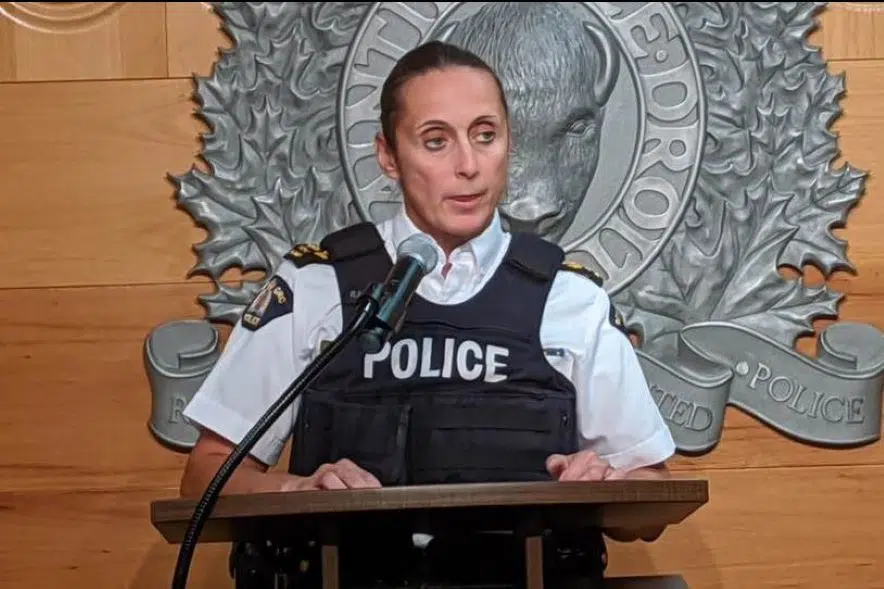The Saskatchewan RCMP is taking steps to make sure it learns from September’s mass murder on the James Smith Cree Nation.
Assistant Commissioner Rhonda Blackmore said Thursday during an RCMP media conference that an independent officer review was requested by her and the criminal services officer in Saskatchewan on Sept. 8 — the day after Myles Sanderson was apprehended.
Blackmore reiterated that request during a conversation with Gormley on Friday.
“We do feel it’s important to make sure that lesson’s learned,” Blackmore said. “(It could be something) positive or if there’s areas we need to improve, (it’s vital) that that be brought out as quickly as possible and we’re expecting a report in the near future.”
She confirmed the report will be made public after the coroner’s inquest into the mass killings has been completed to avoid tainting it.
On Sept. 4, 11 people died and 17 others were hurt when Sanderson went on a stabbing rampage on the James Smith Cree Nation and in Weldon.
Blackmore told Gormley the main goal of releasing the preliminary timeline of the events that took place that day was to follow up on the RCMP’s commitment to release more information when it became available.
“A big piece of this is also making sure that the families get information that they are seeking. They have a lot of unanswered questions and they have a very long and difficult journey ahead of them as they try to heal from this trauma,” Blackmore said. “Some of this information really provided answers to them and, again, we’ll see more of those answers provided at the coroner’s inquests.”
She added police didn’t feel releasing the information would compromise the integrity of the coroner’s inquest into the murders.
“We consulted with the chief coroner and he agreed (that it wouldn’t),” she said.
The Saskatoon Police Service and the Saskatchewan Serious Incident Response Team are involved in the investigation of Sanderson’s death, Blackmore added.
“Shortly after he was apprehended, Myles went into medical distress and his death is being investigated by those two agencies and they will have a separate coroner’s inquest that will look at all of the details around that and have that information that will be released then,” she said.
Blackmore added she was surprised by the unpredictable nature in which Sanderson travelled around James Smith Cree Nation.
“It certainly wasn’t methodical. If he had a plan, it was certainly only known to him,” Blackmore said. “He … acquired six different vehicles throughout this incident and it was very much all over the First Nation from one end to the other.”
She said she believes that certainly added to the chaotic nature of what was happening.
“It wasn’t on one street or in one location. It was over over the entirety of the First Nation,” Blackmore said.
Even though an emergency alert was issued to warn people that Sanderson and his brother, Damien, could be in Regina driving a black Nissan Rogue, she confirmed the information police have now does not indicate that vehicle was ever in Regina.
“We had the licence plate. People were calling in confirming that they had seen that licence plate,” she said. “We believe now that information may not have been accurate. It seems that it wasn’t.”
Blackmore said when the RCMP gets information from people who say they’re 100 per cent certain, that information needs to be looked at.
“Having licence plate information really narrows that down,” she said. “There’s a lot of (black Nissan Rogues) out there, but certainly that provided a higher level of detail and added to the credibility of the information that we were receiving.”
Based on the sheer number of victims, Blackmore said the investigation has been a huge undertaking for the RCMP.
“(There were) 11 homicides and each of them had (its) own homicide investigation, essentially. There were a total of 42 crime scenes that were investigated,” she added. “From those crime scenes, we have had 1,250 investigative tasks that have been assigned as we continue to identify new tasks.”
According to Blackmore, 697 exhibits were seized during crime scene processing and 257 witness interviews have been completed by both RCMP investigators and experts from the force’s behavioural sciences branch in Ottawa.











